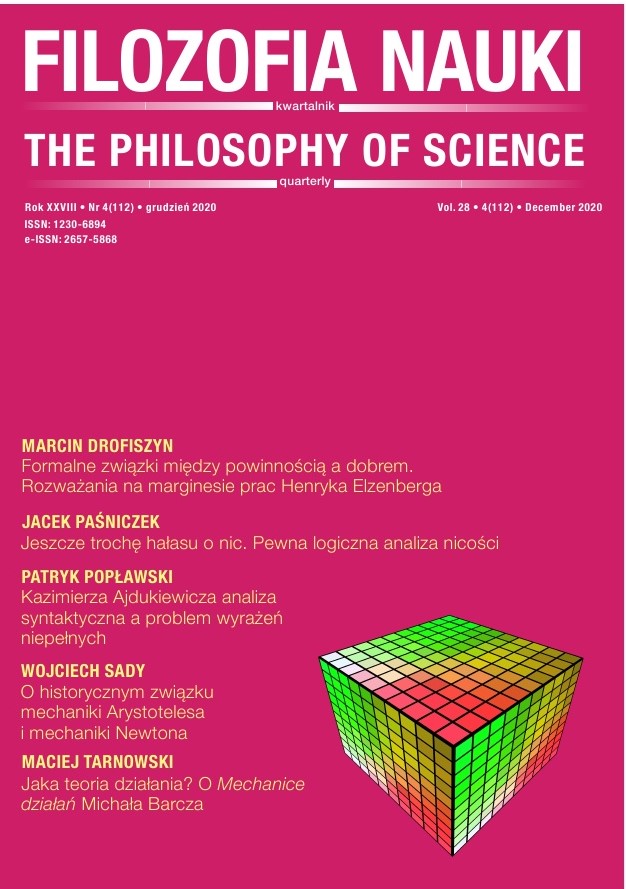What Theory of Action? On Michał Barcz’s "Mechanics of Actions"
DOI:
https://doi.org/10.14394/filnau.2020.0023Keywords:
philosophy of action, causal theory of action, intention, rationality, artificial intelligenceAbstract
This is a review of Michał Barcz’s book Mechanika działań. Filozoficzny spór wokół przyczynowej teorii działania (Mechanics of Actions: Philosophical Dispute over the Causal Theory of Action). The book discusses various causal accounts of intentional action and presents several arguments against them. The review focuses on accuracy in presentation of different causal theories of action and soundness of arguments presented against them by the author. At the end, I discuss some methodological issues raised by the book.
References
Anscombe G. E. M. (1963), Intention, Oxford: Blackwell.
Antony L. (1989), Anomalous Monism and the Problem of Explanatory Force, „The Philosophical Review” 98(2), 153-187. https://doi.org/10.2307/2185281
Barcz M. (2020), Mechanika działań. Filozoficzny spór wokół przyczynowej teorii działania, Warszawa: Wydawnictwo Naukowe PWN.
Bennett J. (1973), Shooting, Killing and Dying, „Canadian Journal of Philosophy” 2(3), 315-323. https://doi.org/10.1080/00455091.1973.10716046
Bortolotti L. (2010), Delusions and Other Irrational Beliefs, Oxford: Oxford University Press. https://doi.org/10.1093/med/9780199206162.001.1
Bratman, M. (1984), Two Faces of Intention. „The Philosophical Review” 93(3), 375-405. https://doi.org/10.2307/2184542
Broad Ch. D. (1952), Ethics and the History of Philosophy, London: Routledge.
Clark A. (1995), Connectionist Minds [w:] Connectionism: Debates on Psychological Explanation, C. MacDonald, G. MacDonald (eds.), Oxford: Blackwell, 339-356.
Davidson D. (1992), Eseje o prawdzie, języku i umyśle, tłum. B. Stanosz, Warszawa: Wydawnictwo Naukowe PWN.
Dennett D. (1987), The Intentional Stance, Cambridge, MA: MIT Press.
Donnellan K. S. (1966), Reference and Definite Descriptions, „The Philosophical Review” 75(3), 281-304. https://doi.org/10.2307/2183143
Dretske F. (1988), Explaining Behavior. Reasons in a World of Causes, Cambridge, MA: MIT Press.
Dreyfus H. L. (1992), What Computers Still Can’t Do: A Critique of Artificial Reason, Cambridge, MA: MIT Press.
Grant D. C., Harari E. (2005), Psychoanalysis, Science and the Seductive Theory of Karl Popper, „Australian & New Zealand Journal of Psychiatry” 39(6): 446-452. https://doi.org/10.1080/j.1440-1614.2005.01602.x
Grudzińska J. (2007), Semantyka nazw jednostkowych, Warszawa: Wydawnictwo Naukowe Semper.
Grünbaum A. (1979), Is Freudian Psychoanalytic Theory Pseudo-scientific by Karl Popper’s Criterion of Demarcation?, „American Philosophical Quarterly” 16(2), 131-141.
Hornsby J. (1997), Simple Mindedness: In Defense of Naive Naturalism in the Philosophy of Mind, Cambridge, MA: Harvard University Press.
Kim J. (1976), Events as Property Exemplifications [w:] Action Theory, Dordrecht: Springer. https://doi.org/10.1007/978-94-010-9074-2_9
Kim J. (1989), The Myth of Non-reductive Materialism, „Proceedings and Addresses of the American Philosophical Association” 63(3): 31-47. https://doi.org/10.2307/3130081
Lowe E. J. (2008), Personal Agency. The Metaphysics of Mind and Action, Oxford: Oxford University Press.
Mele A. R. (1992), Springs of Action, Oxford: Oxford University Press.
Miłkowski M. (2013), Explaining the Computational Mind, Cambridge, MA: MIT Press. https://doi.org/10.7551/mitpress/9339.001.0001
O’Connor T. (2000), Persons and Causes: The Metaphysics of Free Will, Oxford: Oxford University Press.
Papineau D. (2007), Naturalism [w:] The Stanford Encyclopedia of Philosophy (Summer 2020 Edition), E. Zalta (ed.), URL = <https://plato.stanford.edu/archives/sum2020/
entries/naturalism/>.
Ramsey W., Stich S., Garon J. (1991), Connectionism, Eliminativism and the Future of Folk Psychology [w:] The Future of Folk Psychology, Intentionality and Cognitive Science, J. Greenwood (ed.), Cambridge University Press, Cambridge.
Searle J. R. (1980), Mind, Brains and Programs: A Debate on Artificial Intelligence, „The Behavioral and Brain Science” 3, 128-135. https://doi.org/10.1017/S0140525X00005756
Searle J. R. (1983), Intentionality: An Essay in the Philosophy of Mind, Cambridge: Cambridge University Press.
Sehon S. (2005), Teleological Realism, London: MIT Press.
Skokowski P. (2009), Networks with Attitudes, „AI & Society” 10, 461-470. https://doi.org/10.1007/s00146-007-0175-5
Stich S. P. (1981), Dennett on Intentional Systems, „Philosophical Topics” 12(1), 39-62. https://doi.org/10.5840/philtopics198112142
Tarnowski M. (2019), Czy posiadanie sprzecznych przekonań jest możliwe? Omówienie i krytyka argumentów za psychologiczną zasadą niesprzeczności, „Studia Semiotyczne” 33(2), 323-353.
Thomson J. J. (1971), The Time of a Killing, „The Journal of Philosophy” 68(5): 115-132. https://doi.org/10.2307/2025335
Varela F. J., Thompson E., Rosch E. (2017), The Embodied Mind: Cognitive Science and Human Experience, Cambridge, MA: MIT Press. https://doi.org/10.7551/mitpress/9780262529365.001.0001



















 Filozofia Nauki/The Philosophy of Science | ISSN 1230-6894 | e-ISSN 2657-5868
Filozofia Nauki/The Philosophy of Science | ISSN 1230-6894 | e-ISSN 2657-5868